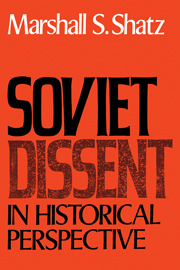Book contents
- Frontmatter
- Contents
- Preface
- 1 Introduction
- 2 The genesis of the Russian intelligentsia
- 3 The formation of a Russian intelligent
- 4 Reason and revolution
- 5 Khrushchev and the de-Stalinization campaign: the development of literary dissent
- 6 The Siniavsky–Daniel trial and its aftermath: legal tactics and organizational efforts
- 7 The Soviet dissidents
- 8 Programs and prospects
- Notes
- Select bibliography
- Index
2 - The genesis of the Russian intelligentsia
Published online by Cambridge University Press: 04 August 2010
- Frontmatter
- Contents
- Preface
- 1 Introduction
- 2 The genesis of the Russian intelligentsia
- 3 The formation of a Russian intelligent
- 4 Reason and revolution
- 5 Khrushchev and the de-Stalinization campaign: the development of literary dissent
- 6 The Siniavsky–Daniel trial and its aftermath: legal tactics and organizational efforts
- 7 The Soviet dissidents
- 8 Programs and prospects
- Notes
- Select bibliography
- Index
Summary
You kindled in our hearts the holy spark of love for truth, you instilled in us a feeling of proud dignity and freedom … Then, when we had ceased to be children, you grew estranged from us, as though you had become frightened of what you had done.
Letter of Michael Bakunin to his father, 1836.In a recent account of Soviet life in the 1970s, an American journalist drew attention to the lack of individual self-assertiveness he observed among Soviet citizens: “We sometimes speak of a person's ‘sense of self.’ This concept does not exist in the Russian language.” Historically, however, if not strictly speaking, linguistically, Russian life did contain just such a concept: the intelligentsia. The history of this unique Russian social phenomenon extended from the late eighteenth century to the 1930s (the word itself seems to have entered Russian usage only in the 1860s, however), and the present-day Soviet dissidents are in many ways the intelligentsia's spiritual heirs. What links the historical intelligentsia and its latter-day successors, and serves as their defining characteristic, is precisely a concept of individual sovereignty. Their effort to assert a “sense of self” against a political and social environment hostile to it has been, and remains, the source of their dissent from the status quo.
- Type
- Chapter
- Information
- Soviet Dissent in Historical Perspective , pp. 12 - 38Publisher: Cambridge University PressPrint publication year: 1981



